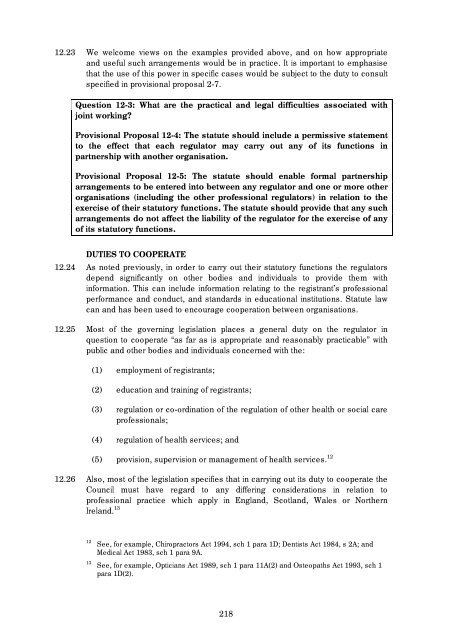Regulation of Health and Social Care Professionals Consultation
Regulation of Health and Social Care Professionals Consultation
Regulation of Health and Social Care Professionals Consultation
You also want an ePaper? Increase the reach of your titles
YUMPU automatically turns print PDFs into web optimized ePapers that Google loves.
12.23 We welcome views on the examples provided above, <strong>and</strong> on how appropriate<br />
<strong>and</strong> useful such arrangements would be in practice. It is important to emphasise<br />
that the use <strong>of</strong> this power in specific cases would be subject to the duty to consult<br />
specified in provisional proposal 2-7.<br />
Question 12-3: What are the practical <strong>and</strong> legal difficulties associated with<br />
joint working?<br />
Provisional Proposal 12-4: The statute should include a permissive statement<br />
to the effect that each regulator may carry out any <strong>of</strong> its functions in<br />
partnership with another organisation.<br />
Provisional Proposal 12-5: The statute should enable formal partnership<br />
arrangements to be entered into between any regulator <strong>and</strong> one or more other<br />
organisations (including the other pr<strong>of</strong>essional regulators) in relation to the<br />
exercise <strong>of</strong> their statutory functions. The statute should provide that any such<br />
arrangements do not affect the liability <strong>of</strong> the regulator for the exercise <strong>of</strong> any<br />
<strong>of</strong> its statutory functions.<br />
DUTIES TO COOPERATE<br />
12.24 As noted previously, in order to carry out their statutory functions the regulators<br />
depend significantly on other bodies <strong>and</strong> individuals to provide them with<br />
information. This can include information relating to the registrant’s pr<strong>of</strong>essional<br />
performance <strong>and</strong> conduct, <strong>and</strong> st<strong>and</strong>ards in educational institutions. Statute law<br />
can <strong>and</strong> has been used to encourage cooperation between organisations.<br />
12.25 Most <strong>of</strong> the governing legislation places a general duty on the regulator in<br />
question to cooperate “as far as is appropriate <strong>and</strong> reasonably practicable” with<br />
public <strong>and</strong> other bodies <strong>and</strong> individuals concerned with the:<br />
(1) employment <strong>of</strong> registrants;<br />
(2) education <strong>and</strong> training <strong>of</strong> registrants;<br />
(3) regulation or co-ordination <strong>of</strong> the regulation <strong>of</strong> other health or social care<br />
pr<strong>of</strong>essionals;<br />
(4) regulation <strong>of</strong> health services; <strong>and</strong><br />
(5) provision, supervision or management <strong>of</strong> health services. 12<br />
12.26 Also, most <strong>of</strong> the legislation specifies that in carrying out its duty to cooperate the<br />
Council must have regard to any differing considerations in relation to<br />
pr<strong>of</strong>essional practice which apply in Engl<strong>and</strong>, Scotl<strong>and</strong>, Wales or Northern<br />
Irel<strong>and</strong>. 13<br />
12<br />
See, for example, Chiropractors Act 1994, sch 1 para 1D; Dentists Act 1984, s 2A; <strong>and</strong><br />
Medical Act 1983, sch 1 para 9A.<br />
13<br />
See, for example, Opticians Act 1989, sch 1 para 11A(2) <strong>and</strong> Osteopaths Act 1993, sch 1<br />
para 1D(2).<br />
218
















